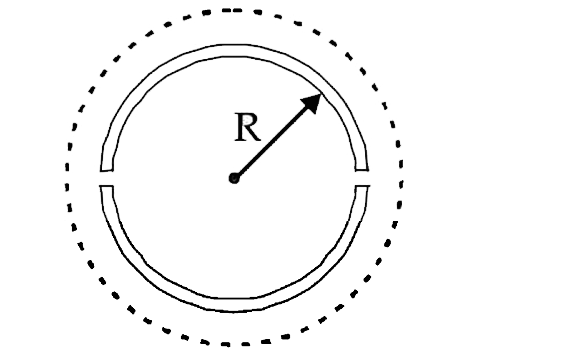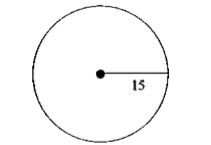A wooden wheel of radius R is made of two semicircular part . The two parts are held together by a ring made of a metal strip of cross sectional area S and length L. L is slightly less than 2πR. To fit the ring on the wheel, it is heated so that its temperature rises by ΔTand it just steps over the wheel. As it cools down to surrounding temperature, it process the semicircle parts together. If the coefficient of linear expansion of the metal is α, and it Young's modulus is Y, the force that one part of the wheel applies on the other part is :

When the ring is heated and then allowed to cool, its new length l.=2πR
∴ Change in length of ring, Δl=l.−l
=2πR−l
∴ Strain developed in ring, Δll=2πR−ll
If T is the tension developed in the ring, then
Y=TA.lΔl
⇒T=YAΔll=YA(2πR−l)l
For each semiconductor part,

If one part of the wheel applies force F on the other part, then
F=2T=2YA(2πR−l)l
=2YA(2πR−ll)
Topper's Solved these Questions
- THERMAL PROPERTIES OF MATTERBook:MODERN PUBLICATIONChapter:THERMAL PROPERTIES OF MATTERExercise:NCERT FILE (TEXTBOOK EXERCISE)
Explore 25 Videos
- THERMAL PROPERTIES OF MATTERBook:MODERN PUBLICATIONChapter:THERMAL PROPERTIES OF MATTERExercise:HIGH ORDER THINKING SKILLS AND ADVANCED LEVEL
Explore 10 Videos
- THERMAL PROPERTIES OF MATTERBook:MODERN PUBLICATIONChapter:THERMAL PROPERTIES OF MATTERExercise:CONCEPTUAL QUESTIONS
Explore 16 Videos
- SYSTEMS OF PARTICLES AND ROTATIONAL MOTIONBook:MODERN PUBLICATIONChapter:SYSTEMS OF PARTICLES AND ROTATIONAL MOTIONExercise:Chapter Practice Test (for Board Examination)
Explore 16 Videos
- UNITS AND MEASUREMENTBook:MODERN PUBLICATIONChapter:UNITS AND MEASUREMENTExercise:CHAPTER PRACTICE TEST
Explore 15 Videos
Similar Questions
Knowledge Check
The diameter of a fly wheel is R. Its coefficient of linear expansion is α. If its temperature is increased by δT the percentage increase in its moment of inertia is
A200×α×ΔTB100×α×ΔTC50×α×ΔTD150×α×ΔTA metal ring of initial radius r and cross-sectional area A is fitted onto a wooden disc of radius R > r. If Youngs modules of metal is Y then tension in the ring is
AAYRrBAY(R−r)rCYA(R−rr)DYrARThe length of an iron wire is L and area of cross-section is A. The increase in length is l on applying the force F on its two ends. Which of the statement is correct
AIncrease in length is inversely proportional to its length LBIncrease in length is proportional to area of cross-section ACIncrease in length is inversely proportional to ADIncrease in length is proportional to Yound's modulus.
Wheels are made circular. Why ?
View SolutionA uniform ring of radius R and made up of a wire of cross - sectional radius r is rotated about its axis with a frequency f. If density of the wire is ρ and young's modulus is Y . Find the fractional change in radius of the ring .
View SolutionTwo straight metallic strips each of thickness t and length l are rivetted together. Their coefficients of linear expansions areα1andα2. If they are heated through temperature ΔT, the bimetallic strip will bend to form an arc of radius
View SolutionA steel ring of radius r and cross section area A is fitted on to a wooden disc of radius R(R>r). If Young's modulus be E, then the force with which the steel ring is expanded is
View SolutionAn iron tyre is to be fitted onto a wooden wheel 1.0 m in diameter. The diameter of the tyre is 6 mm smaller than that of wheel the tyre should be heated so that its temperature increases by a minimum of (coefficient of volume expansion of iron is 3.6×10−5/∘C)
View Solution


